Phantom Sisters? 5 Films That Make You Doubt
Do you have the experience that you suddenly become aware of an indefinable emptiness in your own life and start to doubt whether there is another “you”, who lives in another parallel universe?
Have you ever imagined that at some moment, the life of another “you” might weave into yours?
According to Lacan, as babies from 6 to 18 months old, we started to be infatuated with our own shadow in the mirror, and the infatuation will accompany us for all our life. Just like a shadow, the notion of “another you” might strike you from time to time and even become one of your indelible nightmares.
As an unexhausted summary, I’d like to provide 5 films that are centered around two look-alike women, or perhaps we can say, the double life of one woman. The female double here is not only an engaging visual spectacle, but also a central narrative motif.
5. La double vie de Veronique (Kieslowski, 1991)
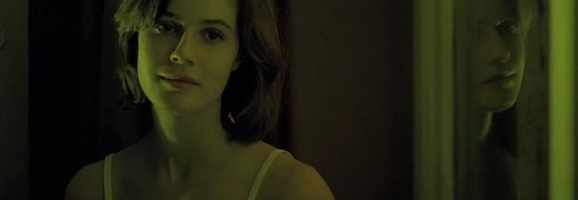
The first scene of La double vie de Veronique is already mesmerizingly poetic: In 1968, in Poland, a little girl is shown the stars in the winter sky by her mother, who identifies the Christmas Eve star. In France, a little girl is shown one of the first leaves of spring by her mother, who points out the fine veins running through.
In 1990, when the Polish Veronika is singing a sole part during a concert, she collapses onstage and dies- a typical scene of swan song. Like the Polish Veronika, the French Veronique has a passion for singing and suffers from heart disease. Unlike the Polish Veronika, she quits her singing career and carries on her life as a music teacher. The parallel life of the two phantom sisters has actually intersected at a fatal or redemptive moment: in a proof sheet of photos taken on Veronique’s recent trip to Poland, her lover notices what he thinks is a photo of Veronique, but it is not her- she in fact took the photo.
Veronique starts to feel lonely after the death of Veronika even when she was making love with her lover. Her emptiness here manifests itself in an almost random search for what has been lost – the sense of loss and the sense of wandering, displacement, and alienation.
It’s doubtable whether the parable of Veronika and Veronique mediates obliquely the fate of a “unified” Europe after the fall of the Berlin Wall. Nevertheless, what really intrigues me is whether it’s human intuition to believe that “all my life I’ve felt like I was here and somewhere else at the same time.” If we really need a double because of the fragility of life, can we say that it’s because our life is so fragile that it is of great beauty?
4. Love Letter (Iwaii Shunji, 1995)
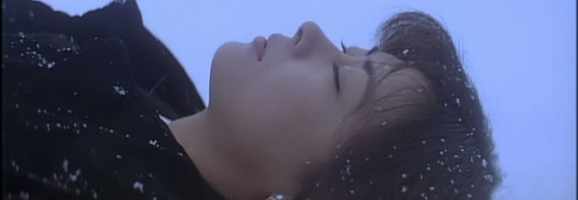
A love letter mailed to paradise. A gaze into youth. A funeral for yesterday.
Hiroko writes a letter to her dead lover Itsuki and gets a reply from a woman who also has the name of Itsuki, but looks extremely similar to Hiriko herself. It’s cruel for Hiroko to recognize that the love at first sight between male Itsuki and her has its reason – female Itsuki, classmate of male Itsuki at middle school.
In the “past tense” love story between middle school students Itsuki (male) and Itsuki (female), Itsuki (male) fell in love with Ituski (female) partly because they shared the same name, which, I believe, indicates it’s actually a story of narcissism, a modern version of the Greek myth in which Narcissus saw his own reflection in the water and fell in love with it, not realizing it was merely an image. The “love letter” between two look-alike women, in a certain sense, reconfirms “narcissism”.
The J-style cinematography of this film is also breathtaking beautiful. For instance, in the scene where the high-school female student Itsuki is working at the public library, she is filmed slightly out of focus, bathed in a clean, clear, white light from the window behind her. Here overexposure helps create a dreamlike atmosphere. Another unforgettable scene in Love Letter is a ten-second shot that is left to a dragonfly, dying on ice. It’s a moment of incredible detail and almost tactile sharpness. Only these extremely sensitive cinematographers can lead us to discover these small miracles in everyday banality: creation, destruction, life, and death. As we can see in almost all Iwaii’s film, these quotidian moments of daily life are always elevated into something transcendent and mesmerizingly beautiful whispering to us.
3. Lunar Eclipse (Wang Quan’an, 1999)
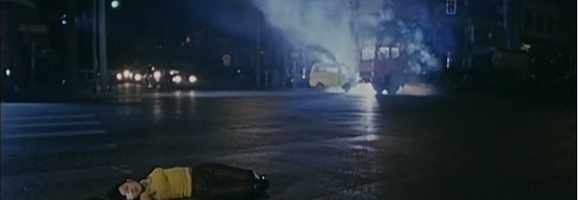
As the title of the film ,”Lunar Eclipse”, indicates, it’s again a story about light and shadow.
Different from La double vie de Veronique and Love Letter, the two woman of extreme resemblance, Ya Nan and Jia Niang, both living in Beijing, do not appear same-aged. It has been quite a while since Ya Nan gave up acting and chooses to be a housewife of a well-to-do man whereas the younger Jia Niang, is still dreaming of a career as a film actress. Will Jia Niang become Ya Nan someday in the future?
In a “double life” story, the moment that the two phantom sisters have their fatal encounter is always considered the moment of fulfillment. In Lunar Eclipse, the moment happens when Ya Nan and the dying Jia Niang see each other, rendered in a shot and reverse shot structure. In a certain sense, the scene is a recurrence of the beginning of the film- hit by a car, Ya Nan is seen lying unconscious in a street. Thus, the later scene fulfills, in a special way, an unfulfillable human desire: to see how oneself dies.
Lunar Eclipse is not only a film about the uncanny double, but also a witness of post-1989 Beijing, a fast-changing city with “schizophrenia”, no matter in terms of economic systems, social patterns or cultural parameters. What can best describe the modern individual living in the “post” age, is nothing more than the split personality. It’s no exaggeration to say that double consciousness has become the hallmark of the modern individual, if not its very definition.
2. Suzhou River (Lou Ye, 2000)
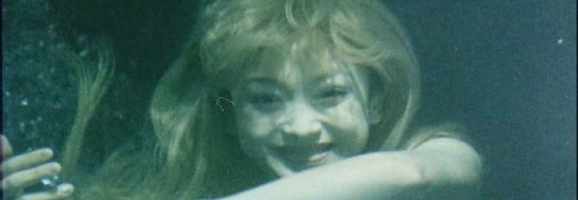
Only several months after the release of Lunar Eclipse, Lou Ye’s Suzhou River emerged from the water. This time, the story is set in contemporary Shanghai.
Suzhou River is a film that slides on the edge between reality and fiction. As the voice-over of the invisible narrator indicates:
“I often go out to shoot the Suzhou River with my camera, floating down the river from West to East and cutting across all of Shanghai. The river is a century’s worth of legends, stories, memories and all that rubbish, all of which makes it the filthiest river. But there are still many people here, making a living on the river. If you look long and hard, the river will let you see everything… people, lonely people… I have seen the birth of a baby, a girl jumping into the river, the corpses of a pair of lovers being lifted out of the water by the police… As for romance, I have seen a mermaid who was combing her blond hair… But don’t believe me, I’m making all this up.”
No matter whether the story is made up or not, it’s mysterious enough to find out that the girl jumping into the river and the “mermaid” at Happy Tavern bear a striking resemblance. So many clues are given to the audience suggesting the two girls are perhaps the same one. But… it does not matter much since they are just one/two among the numerous girls in Shanghai, apt at performing multiple identities and unable to tell “who I am…” With the polluted Suzhou River as the background, the subjective conceptions of love are frustrated and disappointed in this dirty city.
1. Green Tea (Zhang Yuan, 2003)
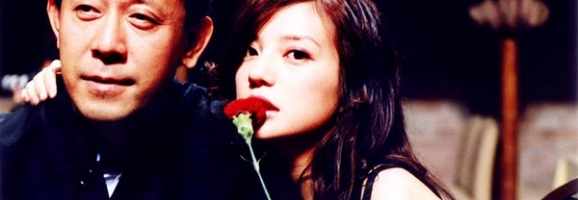
Have you seen the dancing of green tea leaves? It amazes me to see how green tea leaves can dance in such an elegant, unmindful way in this film.
The phantom sisters here are Wu Fang, a bookish graduate student and Lang Lang, a sexy bar pianist. What makes the story even more complicated is, during the blind dates between Wu Fang and Ming Liang, Wu Fang fitfully tells the story of “her friend”, who is probably herself, or perhaps we can say, Lang Lang. Finally Wu Fang agrees to become Ming Liang’s girlfriend. But when Jun has a dinner party planned, Wu Fang is nowhere to be found. Ming Liang asks Lang Lang to pose as his girlfriend. The end of the film is rather ambiguous: Ming Liang brings Lang Lang to a hotel room “just for the night”. At the same time, strangely, we hear the voice of Ming Liang explains why he actually loves Wu Fang on the soundtrack.
Playing two contrasting roles is not double the challenge. Actress Zhao Wei has no problem playing longhaired, glamorously dressed and easygoing, Lang Lang, and she is even better in the role of Wu Fang – “turning her from a potential caricature (glasses, upswept hair, tightly wrapped) into a flesh-and-blood character in need of a man who will genuinely care for her.” The cinematography of the film also helps a lot in shaping these two contrasting female characters. Whenever the camera looks at Wu Fang, strong colors and neat compositions are employed to mirror her personality. As for these shots of Lang Lang, the camera roves and roves, like a drunk girl, in diffused lighting and softer tones.
Embracing the theme of “female double”, Green Tea seems to move a step further in terms of achieving a more nuanced understanding of male-female relationships. Is it true that man would always fall in love with “white rose” (quiet and conservative woman) and “red rose” (outgoing and seductive woman) at the same time, hoping to find a woman in whose body “white rose” and “red rose” can be combined into one? Is it true that all the women in the world are in a certain sense “actresses” – in the game of romance, they learn to, and have to, perform their gender?
All in all, you are infatuated with the subject of “double life” only if you believe in the existence of the soul. All these directors that adopt this subject are ambitious in the sense that they try to act as the flight controller of the soul.
Let me end this with the lines of Czeslaw Milosz:
O my love,
where are they,
where are they going.
The flash of a hand,
streak of movement,
rustle of pebbles.
I ask not out of sorrow,
but in wonder.
What do you think? Leave a comment.










Regarding Grean Tea, for those who have not read the original novel by Jin, I highly recommend whom to do it. It is one of the best one I have ever read.
I also really enjoyed the original novel, even more than the film.
Suzhou River is like a modern cross between “Vertigo” and “Last Year at Marienbad,” – great movie. I have not seen any of the other movies, will look them up.
Happy to see you mentioned “Last Year at Marienbad”. Actually I once made an interactive film “Memory Mosaic”, which is under the great influence of this film.
Cool list! Personally, I would put La double vie de Veronique higher up the list.
Being a lover of all things geographical I loved this film’s sense of place and the significance of location.
La double vie de Veronique is definitely the No. 1 in my mind. But it is required by The Artifice to follow the “5,4,3,2,1” order… >O<
Orphan Black FTW!
Nice! A French film springs into mind. What was the damn name of it. It had the guy from The Intouchables in it.
If you have the name of the film, let me know 🙂
This is awesome. I like the sound of all these films.
thanks Wynter!
This is a really cool motif, especially when conveyed via film. I’ve actually never heard of any of these movies, but they all sound intriguing!
Very interesting article. It’s great to see someone with a strong sense of their own voice expressing it in their own way. I’m looking forward to more like this, thanks!
Thanks David! Likewise, really enjoyed reading your article “Liberal Arts Review: How I Met A Girl Young Enough To Be My Daughter” 🙂
Great choices! During my world cinemas studies during uni, I noticed that many big-name international directors create movies that focus on the heart and soul. They then project important societal themes into the story via the way the characters act and react to their environment. Directors such as Wong Kar Wai, Ang Lee and Krystof Kieslowski depict man’s tender shades whilst depicting a physical or existential conflict of great proportions.
Your sincere reply motivates me to write another article on Ang Lee for The Artifice ^_^
I’ve not seen any of these films before but they sound interesting and you’ve definitely persuaded me to give a few of them a watch. Great article!
Glad to know that my article has the “power” to persuade you to give some of them a watch! Lunar Eclipse and Suzhou River might be difficult to find out, though.